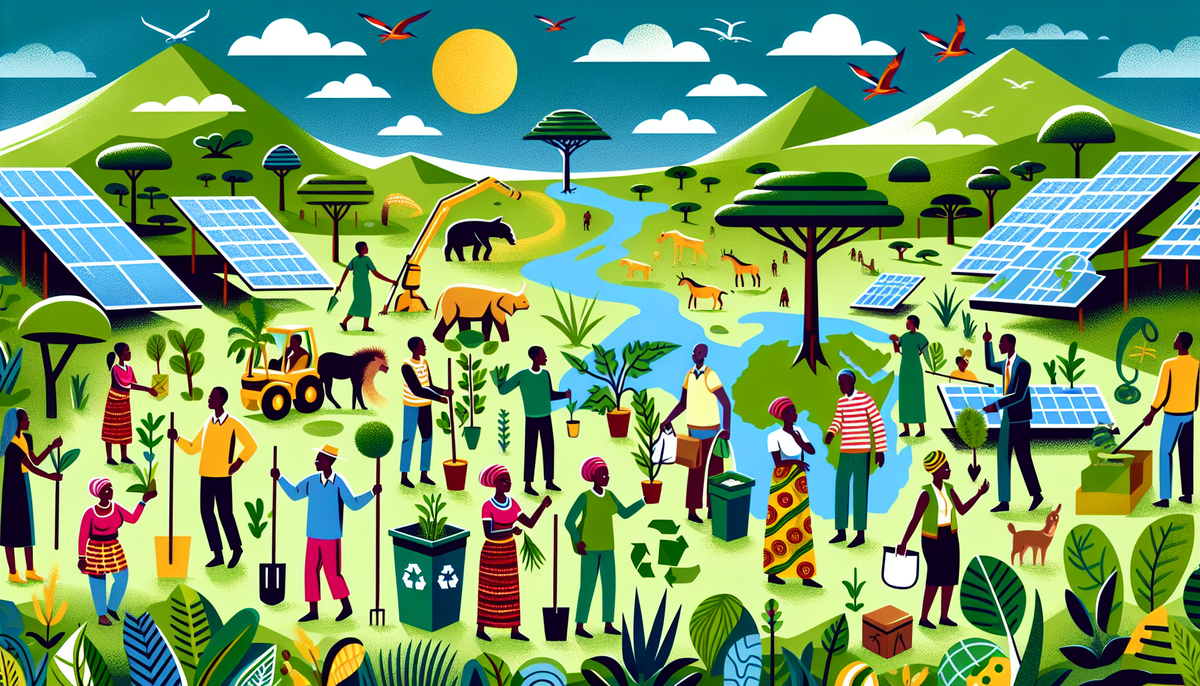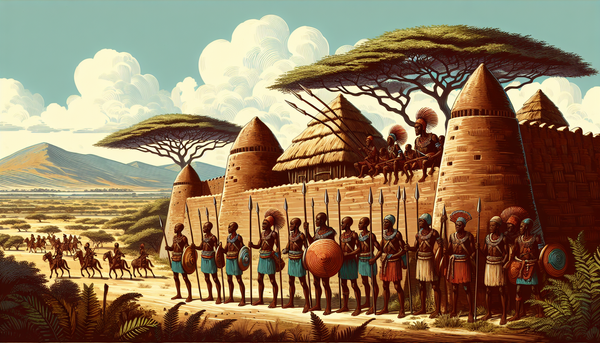African Contributions to Environmental Sustainability

Pioneering Renewable Energy Projects Across the Continent
Africa is making significant strides in the renewable energy sector, leveraging its abundant natural resources to power sustainable development. One of the most notable projects is the Noor Ouarzazate Solar Complex in Morocco, which is one of the largest solar power plants in the world. The facility utilizes concentrated solar power technology to generate electricity for millions of homes while drastically reducing greenhouse gas emissions.
Similarly, Kenya has emerged as a leader in geothermal energy, harnessing the East African Rift’s geothermal potential. The Olkaria Geothermal Plant not only contributes to the national grid but also offers a stable and reliable power source, thus fueling both local and regional economic growth. Wind energy is also gaining momentum, particularly in South Africa, where the country’s wind farms are producing a significant share of electricity, reducing reliance on fossil fuels.
Moreover, decentralized solar initiatives are empowering rural communities across Africa to access clean energy. Projects like M-KOPA in Kenya provide affordable solar home systems, improving quality of life and enabling economic opportunities. These pioneering renewable energy projects demonstrate Africa's commitment to sustainable development and illustrate how innovative solutions can create a greener future for the continent.
Innovations in Sustainable Agriculture Techniques
Africa is witnessing a remarkable transformation in agricultural practices, driven by innovative techniques designed to enhance sustainability and food security. One such method is agroforestry, which integrates trees and shrubs with crops and livestock. This approach not only increases biodiversity and improves soil health but also helps mitigate climate change by sequestering carbon.
Another significant innovation is the use of precision agriculture, enabled by technology such as drones and satellite imagery. Farmers can monitor crop health, optimize irrigation, and apply fertilizers more efficiently, leading to higher yields and reduced waste. Additionally, the adoption of drought-resistant crop varieties is becoming increasingly important in the face of climate variability, allowing farmers to maintain productivity even in arid conditions.
Furthermore, practices like permaculture and conservation tillage are gaining traction, promoting soil conservation and minimizing environmental degradation. These sustainable farming methods are not only enhancing agricultural resilience but also empowering local communities by reducing reliance on chemical inputs and fostering self-sufficiency.
Lastly, initiatives promoting organic farming are rising, focusing on health and sustainability, as consumers increasingly demand chemical-free produce. Through these innovations, Africa is not only advancing its agricultural capabilities but also paving the way toward a more sustainable and secure food system for future generations.
Community-Based Conservation Efforts
Community-based conservation efforts in Africa are highlighting the vital role local communities play in protecting biodiversity and natural resources. These initiatives empower local populations to actively participate in conservation, ensuring that their needs and knowledge are integrated into management strategies. One successful example is the Community Wildlife Conservancies in Kenya, where communities manage and protect wildlife habitats while benefiting economically through eco-tourism and sustainable land use practices.
In Namibia, community-run conservancies are seen as a model for effective conservation. Here, communities benefit directly from wildlife management, receiving supportive funding that encourages sustainable practices and habitat preservation. This not only reduces human-wildlife conflict but also boosts local economies, fostering a sense of stewardship over natural resources.
Moreover, traditional ecological knowledge is increasingly recognized for its value in conservation. Indigenous practices, honed over generations, offer insights into sustainable land management and biodiversity conservation. Programs that integrate this knowledge into formal conservation policies can enhance resilience against climate change and preserve critical ecosystems.
By prioritizing local voices and equitable benefit-sharing, community-based conservation efforts are proving to be effective strategies that not only protect Africa's rich biodiversity but also uplift the livelihoods of those who depend on these natural treasures for their survival.
Advancements in Water Conservation and Management
Water conservation and management are critical issues facing African nations as they grapple with the effects of climate change and population growth. Innovative advancements in this sector are helping to secure precious water resources for both communities and ecosystems. One significant development is the implementation of rainwater harvesting systems, which capture and store rainwater for agricultural and domestic use. This technique is particularly vital in arid regions, enabling communities to enhance their resilience to drought.
Furthermore, the introduction of drip irrigation technology is revolutionizing water use in agriculture. By delivering water directly to the plant roots, this method minimizes evaporation and wastage, boosting crop yields while conserving water. Similarly, integrated water resource management (IWRM) approaches are emerging, emphasizing the sustainable management of water across sectors, fostering collaboration among stakeholders.
Innovations like water purification and recycling technologies are also gaining traction. These systems make it possible to treat wastewater for reuse in irrigation, reducing the demand for freshwater supplies. Additionally, community-led initiatives are playing an essential role in promoting efficient water usage, as local populations implement practices like mulch and cover cropping to preserve soil moisture.
Through these advancements, Africa is paving the way toward sustainable water management practices, ensuring access to this vital resource for present and future generations.
Eco-Tourism and Its Impact on Conservation
Eco-tourism is emerging as a powerful tool for conservation in Africa, promoting responsible travel that supports environmental preservation and local communities. This approach emphasizes sustainable practices, allowing travelers to explore the continent's diverse ecosystems while contributing to conservation efforts. By choosing eco-friendly lodges and engaging in wildlife watching, tourists can generate revenue that is reinvested into protecting wildlife habitats and supporting conservation initiatives.
In countries like Tanzania and Botswana, eco-tourism has transformed national parks and reserves into vital economic assets. The income generated from eco-tourism helps fund anti-poaching efforts, wildlife management programs, and community development projects. For instance, the revenue from safaris in the Serengeti National Park is essential for maintaining the park's biodiversity and protecting endangered species like the African rhinoceros.
Moreover, eco-tourism fosters local involvement in conservation. Communities are encouraged to participate in tourism planning and implementation, ensuring they reap the benefits of preserving their natural heritage. This partnership fosters a sense of ownership and responsibility towards the environment.
Ultimately, eco-tourism not only enriches the traveler’s experience but also creates a sustainable economic model that helps protect Africa’s incredible wildlife and landscapes, proving that tourism and conservation can coexist harmoniously.
Recycling Initiatives and Waste Reduction Strategies
As environmental concerns grow across Africa, innovative recycling initiatives and waste reduction strategies are gaining momentum, transforming how communities manage waste. Cities like Kigali, Rwanda, have emerged as leaders in waste management by implementing comprehensive recycling programs that promote a circular economy. The country's ban on plastic bags is a notable step, encouraging the use of biodegradable alternatives and dramatically reducing plastic pollution.
Community-based recycling projects are also making significant strides. In several urban areas, informal waste collectors are being organized and trained to sort and recycle materials, turning what was once seen as waste into valuable resources. For instance, programs in Ghana are teaching communities to segregate waste at the source, enabling greater recycling rates and reducing landfill reliance.
Furthermore, awareness campaigns are essential in cultivating a culture of recycling and responsible waste management. Initiatives that educate citizens about the benefits of recycling not only lead to higher participation rates but also foster community pride and responsibility.
Innovative approaches like upcycling, where waste materials are creatively repurposed, further support waste reduction efforts. Through these strategies, African nations are paving the way for a more sustainable future, mitigating the environmental impact of waste while promoting economic empowerment and community engagement.
Indigenous Knowledge and Its Role in Protecting Biodiversity
Indigenous knowledge plays a crucial role in protecting biodiversity across Africa, offering insights that have been cultivated over centuries of living in harmony with nature. Communities possessing traditional ecological knowledge have developed sustainable practices that enhance the resilience of their ecosystems, emphasizing a deep understanding of local flora and fauna. This knowledge encompasses everything from seasonal cycles to the medicinal properties of plants, guiding effective resource management.
For instance, the Maasai people in Kenya and Tanzania utilize their traditional understanding of wildlife behavior to practice sustainable grazing methods that promote biodiversity while ensuring livestock health. Similarly, the Himba community in Namibia implements rotational grazing tactics that help preserve grasslands and prevent overgrazing.
Incorporating indigenous knowledge into modern conservation strategies fosters a more holistic approach to biodiversity preservation. Collaborative efforts between indigenous communities and conservation agencies not only recognize the value of traditional practices but also align conservation goals with local cultural values.
Moreover, empowering indigenous peoples to manage their lands leads to better outcomes in conservation efforts, as they possess a vested interest in maintaining the health of their ecosystems. By valuing and integrating indigenous knowledge, Africa can enhance biodiversity conservation strategies and promote sustainable, culturally relevant practices that benefit both people and wildlife.



